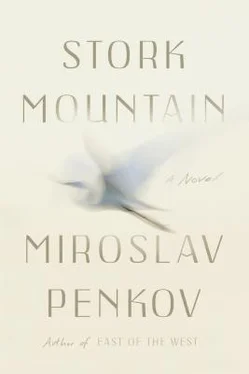Miroslav Penkov - Stork Mountain
Здесь есть возможность читать онлайн «Miroslav Penkov - Stork Mountain» весь текст электронной книги совершенно бесплатно (целиком полную версию без сокращений). В некоторых случаях можно слушать аудио, скачать через торрент в формате fb2 и присутствует краткое содержание. Год выпуска: 2016, Издательство: Farrar, Straus and Giroux, Жанр: Современная проза, на английском языке. Описание произведения, (предисловие) а так же отзывы посетителей доступны на портале библиотеки ЛибКат.
- Название:Stork Mountain
- Автор:
- Издательство:Farrar, Straus and Giroux
- Жанр:
- Год:2016
- ISBN:нет данных
- Рейтинг книги:4 / 5. Голосов: 1
-
Избранное:Добавить в избранное
- Отзывы:
-
Ваша оценка:
- 80
- 1
- 2
- 3
- 4
- 5
Stork Mountain: краткое содержание, описание и аннотация
Предлагаем к чтению аннотацию, описание, краткое содержание или предисловие (зависит от того, что написал сам автор книги «Stork Mountain»). Если вы не нашли необходимую информацию о книге — напишите в комментариях, мы постараемся отыскать её.
Stork Mountain — читать онлайн бесплатно полную книгу (весь текст) целиком
Ниже представлен текст книги, разбитый по страницам. Система сохранения места последней прочитанной страницы, позволяет с удобством читать онлайн бесплатно книгу «Stork Mountain», без необходимости каждый раз заново искать на чём Вы остановились. Поставьте закладку, и сможете в любой момент перейти на страницу, на которой закончили чтение.
Интервал:
Закладка:
“I know it’s not good,” she said. “That’s why I’m crying.”
That night she had another nightmare. The black storks flying. She was convinced Saint Kosta was lurking outside to take away the baby. She was convinced her father had sent him. The heat of her forehead stung me when I kissed her.
“She’s burning,” I told Grandpa, and we measured her fever.
“God Almighty, boy,” Grandpa said in the kitchen. He soaked a kerchief in vinegar. “God Almighty.”
All night Elif tossed and turned. I, on the other hand, lay frozen. Couldn’t sleep, couldn’t move, couldn’t breathe even. A total paralysis of the body. A complete shutdown of the mind. I must have dozed off at last, with the sky growing lighter.
I was in America, back in my apartment, in my bed. The tree outside my window was heavy with black storks. The storks watched me.
“Don’t let them take it from us, amerikanche ,” Elif said in English beside me. “Don’t let them fly away.” Then the storks began to beat their wings and the world around us to rattle. They rose up, a black veil. Nothing I could do would stop them.
“I’m sorry,” I told Elif.
Her face was as hot as the fire. She rested it on my chest and we lay like this in my dream together and we watched the black storks flying.
FIVE
THE ULTRASOUND let out a low hum. The gray screen — a constant whistle, which could not be denied. Flat and high-pitched, it could cross mountains, seas, whole worlds.
“I’m very sorry,” the doctor told us. She was the best in town, a specialist. Grandpa’s old student had sent us to her once before and we were due for a checkup soon. But here we were now, urgently. A big line snaked outside her office, but she worked us right in.
“This is the sack,” the doctor said and showed us. “This is the fetus. Can you see it?”
We could see it. There was no heartbeat. And the doctor said the fetus measured eight or nine weeks old, that it had not developed past that. But it had taken Elif’s body time to react, in stages. First her morning sickness had gone. Now all this.
“When did the spotting first start?” the doctor asked, and Elif told her. She had not told me. She had kept it a secret for two whole days. She’d hoped it would go away, that she’d feel better. Then we woke up to bright-red blood on the white sheet.
I panicked. I cried out, “We need to see the doctor.”
Elif seemed calmer. “I’ll lie still,” she said. “I’ll get better.” But lying still was out of the question. Her back was hurting and the blood wasn’t stopping. I knew she wouldn’t want me to discuss it with Grandpa, but I discussed it. “There is no bus until tomorrow. Can we wait that long?”
He threw away his cigarette. “We can’t wait.” Then he was out the gate, down the road. I heard Elif calling. Saint Kosta had snuck inside, perched on the chair to watch her.
“Get him out,” she cried, and I did. He resisted. He beat his wings; his talons scratched the wood floor. By the time I’d managed to shoo him into the yard, the military jeep was pulling over. The imam was driving.
I was afraid Elif would throw a fit when she saw her father, but she said nothing. We spread a blanket on the backseat and laid her down on the blanket. I rested her head on my lap, petted her cheeks and her forehead. I dabbed the sweat away with a kerchief. I could tell she was in pain, by her eyes, by how hard her teeth were clenching, but she made no sound. Up front Grandpa and the imam too kept quiet. Only in town did they speak — Grandpa was giving directions to the doctor’s office.
Now we were inside the office, cool, dark, like the mosque. An AC unit blew overhead and the drawn blinds buzzed when the air hit them. The ultrasound buzzed. The screen whistled.
The doctor was talking. “This happens to many women. You’ll grieve some, then you’ll feel better. And your body — no damage to it. You’re young. Healthy. You’ll be pregnant again before you know it.”
Then the doctor gave us an option. She could remove the fetus. Or we could wait until Elif expelled it. I thought she ought to remove it. But Elif shook her head lightly. Her face shone awash so bright with screen light — silver, perfectly calm, tender. I couldn’t bear to see it. I couldn’t bear to see the gray screen. I stood up. The doctor was talking. When we went home there would be more blood. Back pain. Contractions. Then Elif would start to expel blood clots, pieces of the placenta. At last she’d expel the fetus. It could be tomorrow, or in a few days. It could be next week. All in all, it could take up to six weeks.
Six weeks, I thought. Carrying the baby like this for six weeks.
SIX
THERE WAS MORE BLOOD that night. There was back pain. Elif lay in bed, under a wool blanket, and her teeth chattered. She was freezing. Grandpa brought her tea, but she wouldn’t look up. She kept her eyes on her hands and her hands stiff on her belly. Every now and then, when the pain got sharper, her hands made fists and her knuckles turned to snowdrops. From time to time I left my chair to open the window, to let the breeze freshen up the air. The entire mountain had sunk into silence. I’d never heard a night so quiet. No wind, no movement. Complete absence.
I must have dozed off in the chair, until Elif’s sobbing woke me. I put my hand on her stomach, but she pushed me away. It wasn’t for her sake I wanted to touch her.
Her voice was hoarse, distant.
“I feel so empty,” she said. “No spite. No venom. No hatred.” She began to sob again and only then did she allow me to sit at the edge of the bed and kiss her forehead. “I’m so clean,” she said. “So new.”
“Then why are you crying?”
She took my hands and pressed her cheek against them. “Don’t you understand?” she said. “It’s all been emptied out. Nothing’s left. Nothing.”
“But I still love you,” I said. She leaned her face on my chest and I held her.
SEVEN
WE COULDN’T LET THE EARTH SWALLOW IT, those black jaws. We couldn’t let the fire. So we climbed the stork tree. We pulled the black towel out of the nest and unwrapped it.
“My kazam ,” Elif said. “My darling.” She set the skull aside and laid our baby upon the towel. It was a tiny thing, but already it had eyes, nubs for arms and legs, and where the brain would be — a dark spot.
Elif had expelled it that morning, after a series of painful contractions. Four days after we’d seen the doctor.
We wrapped the towel around it. We laid it gently into the soft hay.
“What about the skull?” I said.
“What about it?”
We left the skull as it was, in the nest, and we climbed down.
“Don’t look back,” Elif told me.
EIGHT
IT WAS SOMETIME IN OCTOBER when Elif said she was leaving. We were in bed, but turned away from each other. We rarely touched now and if we did, always by accident, we jumped, startled, as if we’d brushed against a furnace.
The winds had grown colder. The days shorter. And the rains had returned to the Strandja. It was raining now, very softly, and out the window the sky looked like a great sea. The clouds were its waves, driving madly away from us, away from Klisura, toward the edge of the world. That’s where the sea emptied out. It had no shores. The nothing contained it.
“I have to leave, amerikanche ,” Elif said. “I can’t stay here.”
My heart understood that. But if I tried to explain it to myself I failed badly. Why couldn’t we work through all that had happened and reemerge stronger together? Why couldn’t we go to America, start a new life?
Читать дальшеИнтервал:
Закладка:
Похожие книги на «Stork Mountain»
Представляем Вашему вниманию похожие книги на «Stork Mountain» списком для выбора. Мы отобрали схожую по названию и смыслу литературу в надежде предоставить читателям больше вариантов отыскать новые, интересные, ещё непрочитанные произведения.
Обсуждение, отзывы о книге «Stork Mountain» и просто собственные мнения читателей. Оставьте ваши комментарии, напишите, что Вы думаете о произведении, его смысле или главных героях. Укажите что конкретно понравилось, а что нет, и почему Вы так считаете.











